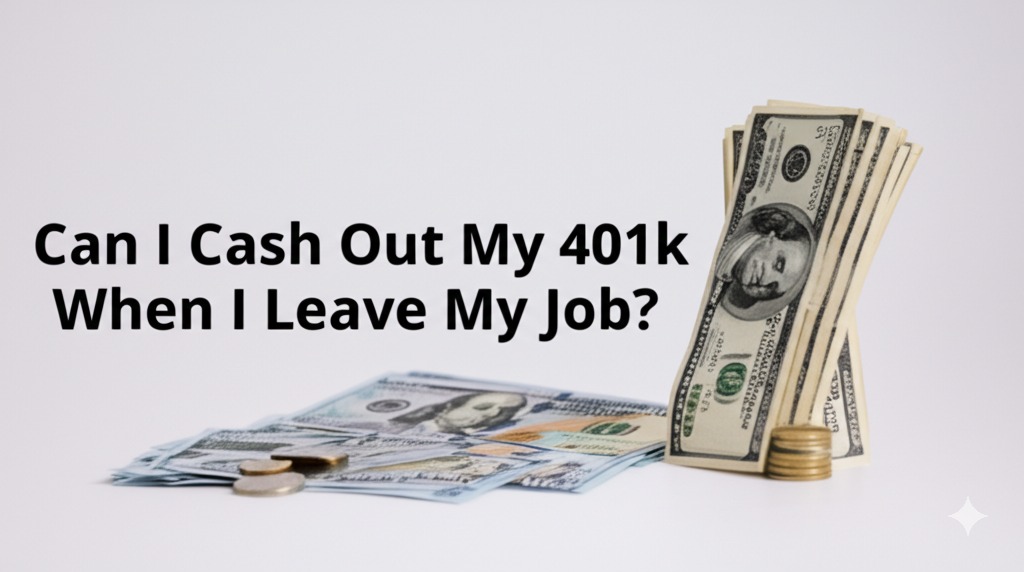
If you’ve recently left your job or are considering making a career change, you might be wondering, “Can I cash out my 401k when I leave my job?” The answer is yes, but it’s essential to fully understand the consequences and options before you make a decision. In this article, we will walk you through the process, explore your options, and help you make the best choice for your financial future.
What Happens to Your 401k When You Leave Your Job?
When you leave your job, your 401k is not simply canceled or forgotten. The funds in your 401k are still yours, and it’s important to know what your options are.
- Leave It in Your Old Employer’s Plan
- If your balance is large enough (typically over $5,000), you may be able to leave your money in your old employer’s 401k plan.
- This can be a convenient option if you are happy with the investment options and fees of the current plan.
- Transfer It to Your New Employer’s 401k
- If you start a new job that offers a 401k plan, you can transfer your old 401k balance into your new employer’s plan.
- This allows you to consolidate your retirement savings and manage them in one place.
- Roll It Over to an IRA
- You can roll your 401k over into an Individual Retirement Account (IRA), which provides more flexibility with investment choices.
- IRAs generally offer a wider range of investment options than most employer-sponsored 401k plans, and rolling over may also provide certain tax benefits.
- Cash It Out
- You can choose to withdraw your 401k funds in a lump sum. However, cashing out comes with several drawbacks, including taxes and penalties.
The Pros and Cons of Cashing Out Your 401k
While it may seem tempting to cash out your 401k when you leave your job, it’s important to weigh the pros and cons.
Pros of Cashing Out Your 401k
- Immediate Access to Funds: If you need cash urgently, cashing out provides quick access to your 401k balance.
- Financial Flexibility: This option gives you complete control over your money and can be used for immediate expenses like paying off debt or covering unexpected costs.
Cons of Cashing Out Your 401k
- Taxes: When you cash out your 401k, you will face income tax on the amount you withdraw. The IRS treats 401k withdrawals as taxable income, so the withdrawal amount will be added to your annual income and taxed accordingly.
- Early Withdrawal Penalty: If you’re under the age of 59½, you will incur a 10% early withdrawal penalty. This is in addition to the taxes you’ll owe.
- Lost Retirement Savings: By cashing out, you’re reducing your retirement savings, which could significantly impact your financial future. You also lose the benefit of tax-deferred growth.
What Are the Tax Implications of Cashing Out a 401k?
When you cash out your 401k, there are two major tax considerations:
- Income Taxes: The amount you withdraw is subject to income tax at your ordinary income tax rate.
- Early Withdrawal Penalty: If you’re under 59½, an additional 10% penalty applies unless you qualify for an exception (such as disability, medical expenses, or a qualified domestic relations order).
Are There Any Exceptions to the Penalty?
In some cases, you may be able to avoid the 10% early withdrawal penalty. These exceptions include:
- Disability: If you become permanently disabled, you may be exempt from the early withdrawal penalty.
- Medical Expenses: If your medical expenses exceed 7.5% of your adjusted gross income, you can withdraw from your 401k penalty-free.
- Court Orders: In certain cases, such as a divorce, a court may order that a portion of your 401k be distributed to your ex-spouse, and this will not be subject to the penalty.
Alternatives to Cashing Out Your 401k
While cashing out may seem like an easy option, there are several alternatives to consider before making a decision.
- Leave It in Your Old Employer’s Plan: If you’re satisfied with your current plan, leaving the money there could be a good option.
- Roll It Over to an IRA: An IRA offers a greater range of investment options and is an excellent way to preserve your retirement savings while gaining more control.
- Transfer to Your New Employer’s 401k: Consolidating your retirement savings with your new employer’s plan might help you stay on top of your long-term financial goals.
How to Cash Out Your 401k
If you ultimately decide to cash out your 401k, here’s how to do it:
- Contact Your 401k Administrator: Reach out to the administrator of your 401k plan to request a distribution.
- Complete the Necessary Forms: You’ll need to fill out the required forms to process your withdrawal.
- Review Your Tax Withholding: Be sure to understand the tax consequences, as the administrator will withhold federal taxes, and state taxes may also apply.
- Receive Your Funds: After the necessary paperwork is completed, you’ll receive your 401k balance as a check or direct deposit.
Conclusion: What’s the Best Option for You?
Cashing out your 401k when you leave your job is an option, but it’s generally not the best choice unless you absolutely need the money. The taxes and penalties associated with withdrawing from your 401k can leave you with much less than you expected, and it can severely hinder your long-term retirement goals.
Instead of cashing out, consider leaving the funds in your old employer’s 401k, rolling them into a new employer’s plan, or moving them to an IRA. These options allow your savings to grow and compound over time without the immediate tax consequences.

Andre Cuevas provides career insights, job search strategies, and professional advice to help individuals navigate the job market and achieve their career goals.






